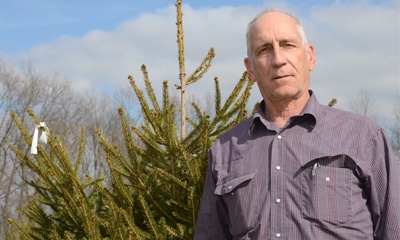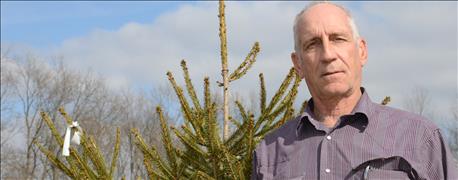
Les Zimmerman didn’t grow up on a farm in Indiana. He grew up in Illinois. He became interested in growing trees, and about 30 years ago, he bought a farm near Clinton in Vermillion County. He established Zimmerman Farm Nursery, a business that grows and sells trees.
If that’s all you know about Les Zimmerman, you really don’t know him. If you could walk around his farm with him, you would get a feel for what drives him, and why he got involved in soil and water conservation.

FROM TREES TO CORN: Once his remaining trees are sold, Les Zimmerman will convert the rest of his farm to cropland. Eventually, it will be no-tilled and seeded each fall with cover crops.
The first stop would be his solar panels, located near his house. “It’s a long payback on my investment, but it’s the right thing to do,” he says. “Conservation is more than protecting soil and water. That’s important, but I take a broader view of the environment. I’m interested in energy sources, and I see a future for solar energy.
“Besides that,” he says with a smile, “I like to see the electric meter on my house run backward when the panels are producing lots of electricity!”
The second stop would be at his barn site, a short drive away. Some equipment and most of the employees are gone because he’s phasing out of the tree business and converting the land back to farmland. But there are still a few pieces of well-kept equipment in the shed, enough to imagine what the business looked like at its peak. “I went out on the road selling trees, but I also enjoyed being here and working with the employees, planting and digging and balling trees,” he explains. “It’s hard work, but it’s rewarding.
Next, Zimmerman would lead you out to one of the few areas of trees still remaining. This particular spot is still growing pine trees. They’re intended to be used for landscaping, not Christmas trees.
“You have to be careful walking out here because there are shallow holes where we’ve dug out trees in the past,” he says. “Part of our job now is to level this area back up once the trees are removed, so we can farm it again.”
Finally, he would walk you over to the edge of one field where his tenant has already grown a crop. Once in trees, it’s now a crop field.
“Working with some great people across the state, I’ve learned that soil health is important,” he says. “My tenant believes in no-till as well. It just takes a couple years to get land back in shape for no-till after trees. Once it’s ready, he will no-till it. That was part of the deal.”
It wasn’t the only part. “We’re going to use cover crops, too,” he says. “I’ve seen the value on many farms and in many demonstration plots. I know what they can do to help the soil.”
About the Author(s)
You May Also Like




